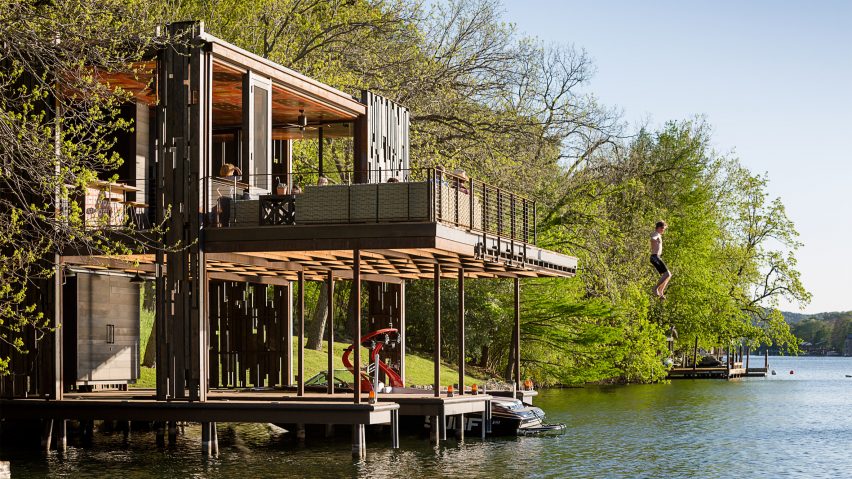US firm Andersson-Wise Architects has created a modest boathouse in Texas, designed to blend with its site as if it were "in a state of natural decomposition".
The Bunny Run Boat Dock is located on the shore of Lake Austin, in the city of Austin. Encompassing 2,563 square feet (238 square metres), the enclosure contains two boat slips on the ground level, and an open-air bar and lounge area on the upper storey.
Situated at the base of a slope, the boathouse is accessed via a stone stairway or a wooden bridge. Wrapped in textured, wooden screens, the rectilinear structure is intended to have a weathered appearance.
"The Bunny Run Boat Dock is an exploration of material and massing intended to look so blended into the site that it appears softly in a state of natural decomposition," said Andersson-Wise Architects, which is based locally.
The team used several species of wood for the project – an amalgamation that is meant to "form an environment that is consistent with the natural wooded shoreline of the lake".
For exterior walls, the team assembled cedar slats of varying lengths in a patchwork formation. Interior walls are sheathed in horizontal cedar boards.
The ceiling is made of Douglas fir, while the flooring is made of sinker cypress – a type of lumber created from old sunken logs that are extracted from lakes and rivers.
The team also incorporated salvaged materials into the building.
"The architectural palette is complemented by several reclaimed items: antique doors from India, a timeworn butcher block from England and a steel structure that weathers naturally," the architects said.
Designed to be an "all-exterior experience", the boathouse is a place where visitors can feel immersed in the natural context.
"The experience is intended to be an inviting homage to the beautiful climate and setting – a place to become connected to and surrounded by nature," the firm said.
Other projects by Andersson-Wise Architects include a remote cabin in Montana with cordwood walls, a green roof and a series of interlocking courtyards.
Photography is by Andrew Pogue.

